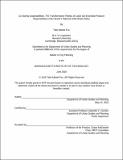Co-opting sustainabilities : the transformative politics of labor and extended producer responsibility under Brazil's national solid waste policy
Author(s)
Fox, Talia Mestel
DownloadFull printable version (1.041Mb)
Alternative title
Transformative politics of labor and extended producer responsibility under Brazil's national solid waste policy
Other Contributors
Massachusetts Institute of Technology. Department of Urban Studies and Planning.
Advisor
Gabriella Y. Carolini.
Terms of use
Metadata
Show full item recordAbstract
Growing levels of global solid waste production implore society to identify the actors responsible for preventing, reducing, and disposing of wasted material in a sustainable manner. Extended producer responsibility (EPR) and corporate social responsibility (CSR) are policy frameworks that hold accountable the manufacturers of goods that create post-consumer waste. National and state governments typically prescribe EPR through market mechanisms, performance standards, and disclosure requirements. CSR relies largely on voluntary programs that international bodies and corporations themselves establish to prevent or remediate socially and environmentally destructive behaviors. Responding to a paucity of research regarding adaptations of EPR to the global South, this thesis traces the origins and outcomes of the 2010 National Solid Waste Policy of Brazil (PNRS), which mandates EPR. I focus on a provision of the PNRS that prescribes CSR in fulfillment of EPR through partnerships between corporations and cooperatives of wastepickers: collectively-organized, self-employed individuals who separate, sort, and sell recyclable materials. Guiding this inquiry is a question regarding the implications of the interactions between the transnational sustainability frameworks of corporations and laborers. Through an analysis of the histories and realities of these interactions, I interrogate the dynamics that shape the structures of CSR programs and their evaluative tools under the PNRS, from the perspective of wastepickers. I assert that these CSR programs, while sources of technical and financial support for wastepickers, by design cannot actualize the concept of EPR because they fail to remunerate wastepickers as market actors. Furthermore, I demonstrate that by controlling the processes that assign and assess responsibility for waste management in Brazil, corporations have co-opted a sustainability discourse of labor that is intended to advance wastepickers' own fight for fair pay, rights, and recognition. Key Words Waste management; municipal solid waste; sustainability; extended producer responsibility, Brazil, waste picker; corporate social responsibility, labor, evidence-based policy.
Description
Thesis: M.C.P., Massachusetts Institute of Technology, Department of Urban Studies and Planning, 2018. This electronic version was submitted by the student author. The certified thesis is available in the Institute Archives and Special Collections. Cataloged from student-submitted PDF version of thesis. Includes bibliographical references (pages 94-101).
Date issued
2018Department
Massachusetts Institute of Technology. Department of Urban Studies and PlanningPublisher
Massachusetts Institute of Technology
Keywords
Urban Studies and Planning.